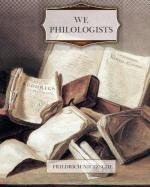170
To overcome Greek antiquity through our own deeds: this would be the right task. But before we can do this we must first know it!—There is a thoroughness which is merely an excuse for inaction. Let it be recollected how much Goethe knew of antiquity: certainly not so much as a philologist, and yet sufficient to contend with it in such a way as to bring about fruitful results. One should not even know more about a thing than one could create. Moreover, the only time when we can actually recognise something is when we endeavour to make it. Let people but attempt to live after the manner of antiquity, and they will at once come hundreds of miles nearer to antiquity than they can do with all their erudition.—Our philologists never show that they strive to emulate antiquity in any way, and thus their antiquity remains without any effect on the schools.
The study of the spirit of emulation (Renaissance, Goethe), and the study of despair.
The non-popular element in the new culture of the Renaissance: a frightful fact!
171
The worship of classical antiquity, as it was to be seen in Italy, may be interpreted as the only earnest, disinterested, and fecund worship which has yet fallen to the lot of antiquity. It is a splendid example of Don Quixotism; and philology at best is such Don Quixotism. Already at the time of the Alexandrian savants, as with all the sophists of the first and second centuries, the Atticists, &c., the scholars are imitating something purely and simply chimerical and pursuing a world that never existed. The same trait is seen throughout antiquity . the manner in which the Homeric heroes were copied, and all the intercourse held with the myths, show traces of it. Gradually all Greek antiquity has become an object of Don Quixotism. It is impossible to understand our modern world if we do not take into account the enormous influence of the purely fantastic. This is now confronted by the principle . there can be no imitation. Imitation, however, is merely an artistic phenomenon, i.e., it is based on appearance . we can accept manners, thoughts, and so on through imitation; but imitation can create nothing. True, the creator can borrow from all sides and nourish himself in that way. And it is only as creators that we shall be able to take anything from the Greeks. But in what respect can philologists be said to be creators! There must be a few dirty jobs, such as knackers’ men, and also text-revisers: are the philologists to carry out tasks of this nature?
172
What, then, is antiquity now, in the face of modern art, science, and philosophy? It is no longer the treasure-chamber of all knowledge; for in natural and historical science we have advanced greatly beyond it. Oppression by the church has been stopped. A pure knowledge of antiquity is now possible, but perhaps also a more ineffective and weaker knowledge.—This is right enough, if effect is known only as effect on the masses; but for the breeding of higher minds antiquity is more powerful than ever.




